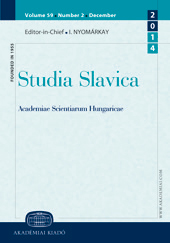Русская литература sub specie mortis: набоковская интерпретация творчества Гоголя Часть 2-я
Russian literature sub specie mortis: Nabokov's interpretation of Gogol's creativity Part 2
Author(s): Zoltán GyörgyiSubject(s): Russian Literature, Theory of Literature
Published by: Akadémiai Kiadó
Keywords: Gogol; Nabokov; Russian symbolism; sophiology; criticism; hermetic tradition;
Summary/Abstract: “Every Russian writer owes something to Gogol.” This Nabokovian statement questions beliefs traditionally formulated in respect to Gogol’s oeuvre. His book paradoxically introduced by the depiction of the writer’s death implies that the motif of death has a specific impact on the genesis of the artefact. The similar postmodernist theory by Terc echoes in part ideas found in the symbolist perception of Gogol (Annensky, Blok, Rozanov, Merezhkovsky, and Andrei Bely). Gogol’s poetics centered upon this principle, reminiscent of Dante’s Divine Comedy, can be traced throughout the works of Russian authors – a thesis to be scrutinised in a series of forthcoming articles. The irrational in Gogol’s views concerning true art thus shall discard the labels of critical realism and art envisaged as the device meant to perfect human society, consequently via the transmutation of the self shall true art fulfil its ultimate mission. Introducing the dichotomy of ‘poet’ – ‘non-poet’ indicates a precursor of the Solovyovian doctrine of the superman. The ideal of transgression is expressed through applying the medieval interpretation of the language distinguishing Dante’s work, offering a profound reading of texts. The poetics of death penetrating Gogol’s works implicates handling and interpreting of various phenomena of culture synthesised, including models of self-perfection realised by alchemy, freemasonry, and Russian sophiology.
Journal: Studia Slavica Academiae Scientiarum Hungaricae
- Issue Year: 59/2014
- Issue No: 1
- Page Range: 129-159
- Page Count: 31
- Language: Russian
- Content File-PDF

